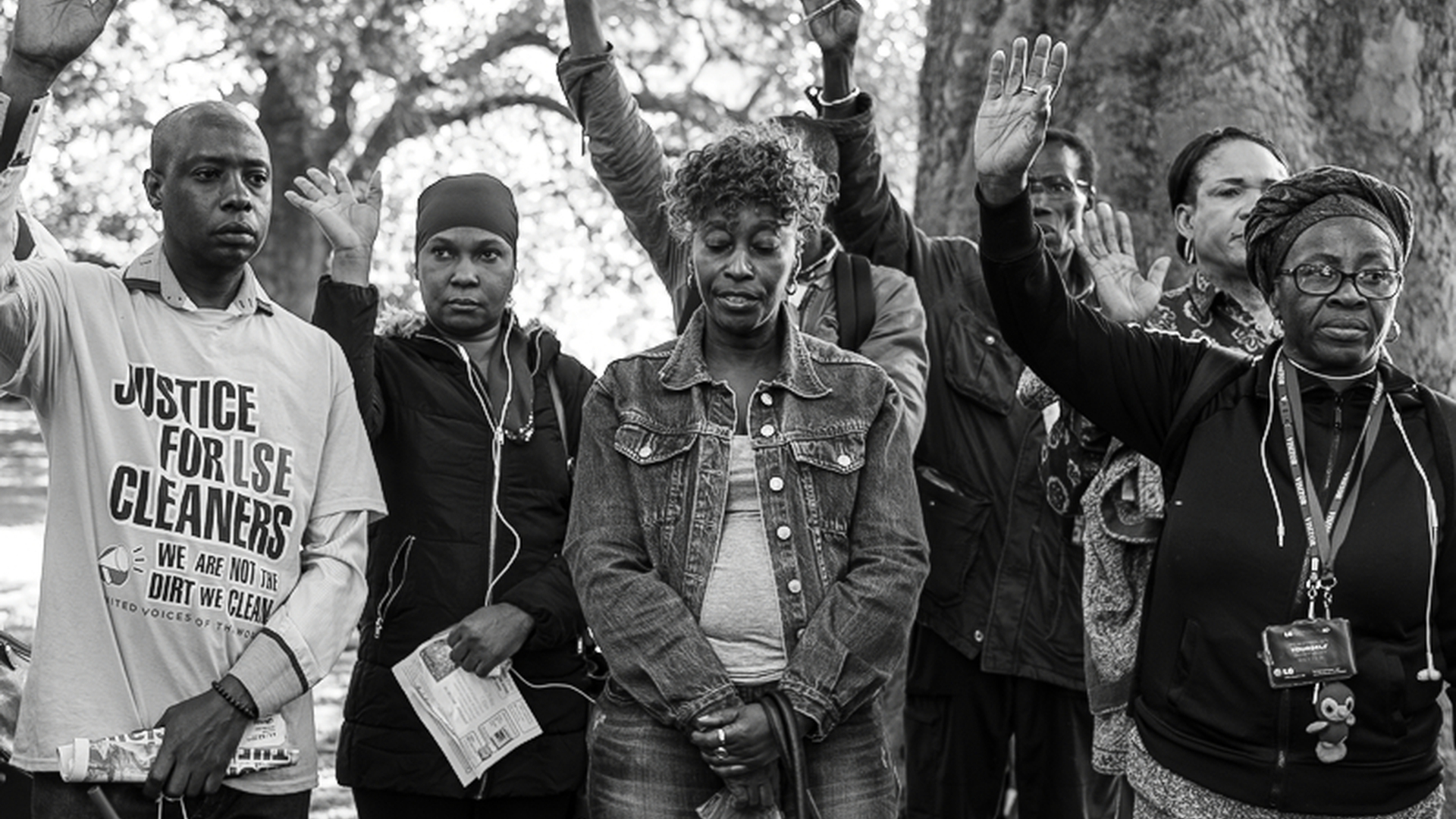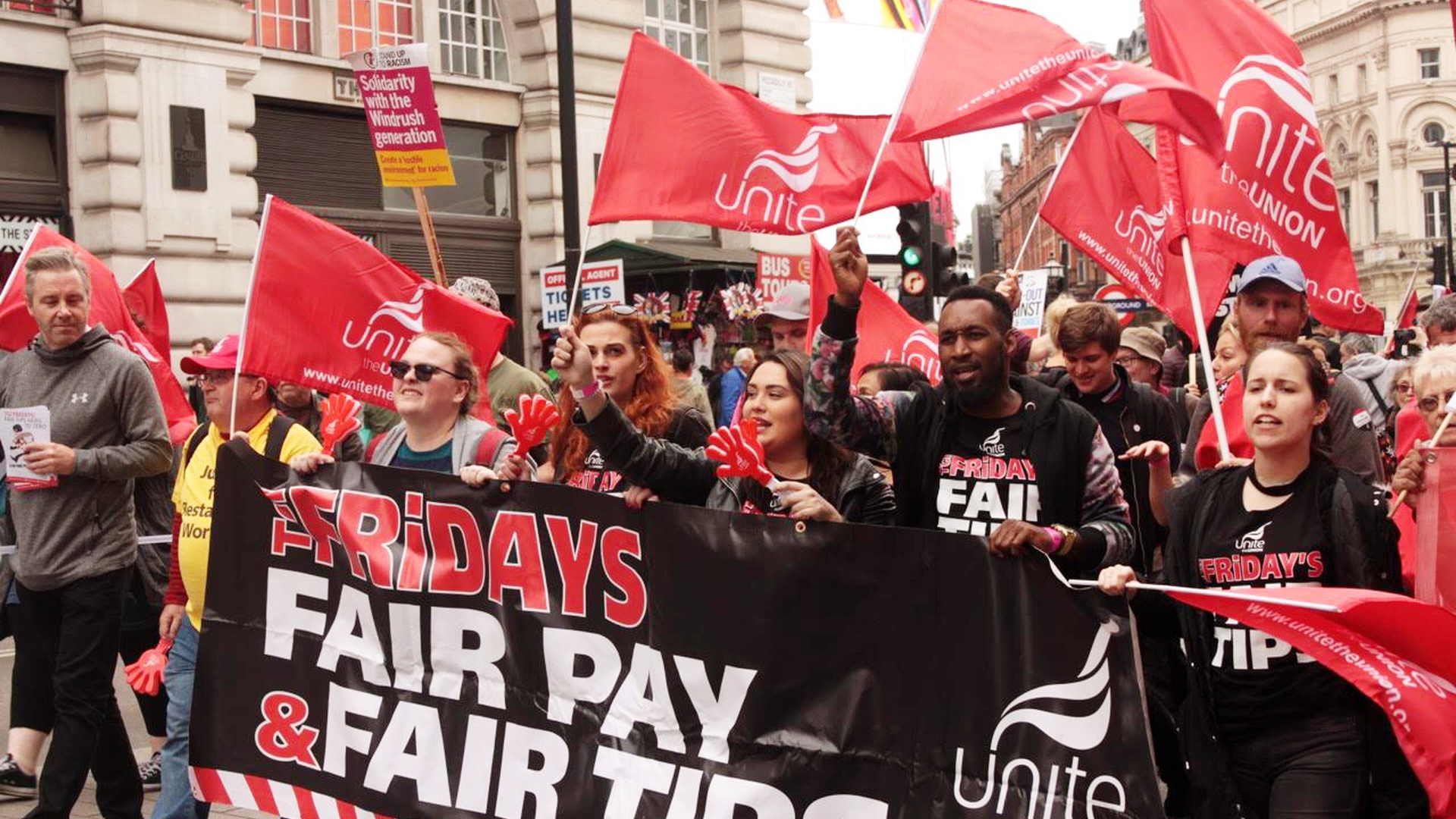Brand Damage: Better Than Zero and the Conditions of Company Fear
by
Sarah Collins,
Cailean Gallagher
August 16, 2018
Featured in The Worker and The Union (#3)
Building power in non-unionised sectors in Scotland

inquiry
Brand Damage: Better Than Zero and the Conditions of Company Fear
Building power in non-unionised sectors in Scotland
Better than Zero is a solidarity network that builds union action in non-unionised sectors including hospitality, fast food, and customer services in Scotland. It has a solid core of activists and a fluid community of 14,000 Facebook followers, who help to compose a real-time chronicle of day-to-day working life by sending accounts of exploitation into the inbox every day. In the week of writing – a pretty typical week – there were reports of a café introducing self-employment contracts, a bar running 5-hour unpaid trial shifts, a hotel in the Scottish highlands that is housing workers in shipping containers and forcing them to work significantly longer than contracted hours, and updates on the effects of changes to Deliveroo’s algorithm for riders in Glasgow. In most cases these reports are written by angry workers who lack collective class power.
Better than Zero was launched in 2015, funded by the Scottish Trades Union Congress (Scotland’s trade union centre, which is completely distinct from the TUC) and inspired by campaigns like the Fight for $15 that was resourced by SEIU in the USA. The campaign developed a dual strategy of public brand damage and legal action, and its most striking tactic has been to release steady salvos of set-piece stunts and social media allegations against employers that are reported for exploitative practices. The effect has been to stamp the black and white “>ZERO” symbol onto companies’ public image – symbolized by the stickers that appear on the venue’s doors, tables, and menus. Such companies have been Better than Zeroed. They often give way to demands.
For instance, the G1 Group, Glasgow’s most expansive nightlife empire, promised to end to zero-hour contracts and to restore unpaid wages to numerous staff after Better than Zero revealed a catalogue of anecdotes about unpaid hours, sexist uniform rules, unfair dismissals, and unsafe circumstances at the end of shifts. Staff joined Unite, and the company is now being taken to an employment tribunal. Las Iguanas, a restaurant, altered its policy to give tips to workers rather than pooling them. Mooboo drinks company attempted to introduce lengthy unpaid trial shifts and changed its offer as a result. And over Christmas the campaign joined Unite and the Fair Fringe campaign to sear its brand onto Underbelly, one of the big three companies involved in the Edinburgh Fringe that also runs Edinburgh Hogmanay, and planned to recruit 300 volunteers to replace former paid workers. The number of volunteers fell to 19.
The Better than Zero brand has become recognizable in Scotland as marking a workplace where workers have experienced employer exploitation and had the courage to expose it. This has forced the issue of bad work into Scottish politics and media. But while Better than Zero has won one-off gains it’s been limited in the number of significant concessions and rebalances of power in workplaces. Why? Employers are not scared enough of brand damage. Messages have tended to use moral condemnation, rather than exposing class-based exploitation. And the tactic has sometimes relied on Better than Zero as a force external to the workers – a group of self-selecting activists, distinct from workplace leaders, who are called upon as a ‘hit squad’. This means that the campaigns have not developed dense, durable workers’ organisations, and leaders seldom emerged from the staff compositions.
In truth, much has been based on a kind of Better than Zero mythology. The myth: that workers in hospitality, retail and similar work have had enough; they are angry and they are determined to get dignity and rights; and one by one, the employers of the city are going to be subject to the attack of workers acting in solidarity, on the incendiary principle of we’ll brand your bosses if you brand ours.
Myths should not be neglected by the workers’ movement. They help to encourage acts of courage. Something like this happened in KFC and McDonald’s in the town of Livingstone. In March, when central Scotland was stalled by the snow, workers in both restaurants decided they were determined to go home early instead of the cold and dangerous walk for miles at the end of the shift. Some of the KFC workers knew the myth of Better than Zero creating wins, so they contacted the campaign, expecting a shower of criticisms to be hurled at the companies. Instead of this, activists encouraged the workers to lift the brand themselves – non-unionised, they used the Better than Zero symbol to rally workers, they wrote an ultimatum to management that forced the shut-down of McDonald’s, then they crossed the road to KFC and achieved the same. It resulted not only in the victory, but in a new set of leaders who are now leading a ‘Safe Home’ campaign to force employers to pay for late-night transport costs.
Better than Zero is finding new means of making the myth real. Now, if a company is branded, the workers themselves have to hold the tools – to heat the iron, to shape the message, and to decide where and when to imprint the BTZ symbol on their bosses. Thus far, workers have been liable to fear the brand as much as bosses, because it stands for an external and unpredictable assault by activists who are likely to divert their view to another company and leave the former workplace to writhe, or wither, or heal. In future, bosses will be right to fear it, because the workers themselves will be inflicting the damage collectively, and are prepared to supplement it with other action.
This strategic shift raises tactical questions in every active workplace. Under what conditions will bosses fear their workers acting through Better Than Zero? What would prepare and equip the workers to create these conditions and instill the fear in their employers that will provoke either a worthy concession or winnable conflict? How can workers be at the same time secure from self-detriment and dismissal? What will incite them to form a branch of Unite, BFAWU, BECTU, or another affiliate of the STUC (Scottish Trades Union Congress) that would bring in heavyweight support to back up their demands?
The answers depend on detailed inquiries. In each case workers will be in a position to decide on their actions if they conduct a simple observation of the circumstances that affect the company operations. Employer vulnerability depends on factors like profit margins, wage costs, recruitment speed, the constant and variable capital ratio. Edinburgh tour-guides have been working with Better than Zero to halt the decline in pay, but the company is making £3 for every £1 it spends on labour, and staff have found themselves supplanted by new recruits who make it hard to harm the business. They are therefore taking a longer-term approach, building up a network of resilient and reliable colleagues.
To prepare for action workers need to know staff scheduling and composition, the risk of discipline, and of course the will to resist amongst the full staff cohort. Workers in a Wholefoods shop in Glasgow who had been underpaid for months and subject to extreme monitoring, went to work to find hidden cameras in their staff changing room - they immediately rallied, resisted the bosses’ attempt to divide and rule, agreed not to work, then contacted Better than Zero to support their process of redress and public shaming.
In terms of tactics for union-building, workers should know pay policies, timescales for any automation, the prospect of policy changes, and changes to management, staff, or work structures. In June, workers at a major cinema chain contacted Better than Zero about changes to taxi allowances that amounted to monthly pay cuts of more than £100. With Better than Zero organisers, they analysed the policy’s profit-boosting purpose, and used their knowledge of its implementation and effect to build up majority support for their demands to reinstate the allowance. On this bed of support, they formed the first Scottish union branch in the chain.
Observing these factors requires significant levels of insight, inquiry, and organic leadership. The working class needs to redevelop skills to undertake such research. So, influenced by the Marx’s promotion of workers’ inquiry, revived by Notes from Below, and supported by Kendra Bricken of Strathclyde University, Better than Zero is developing active research and leadership skills for workers to conduct their own firm-level enquiries. Better than Zero is building a network of organic leaders through regional ‘hubs’ where workers from across different workplaces assemble to consider their capacity for inquiry and to identify target sites to work on. It is working with another STUC-backed group, the Young Workers’ Project, to deliver intense courses on how workers can take control through workplace inquiry and independent action. And it is supporting individual worker groups to conduct their own activity.
The aim is not to single out certain workplaces as aberrations in the world of work. It is rather to build consciousness that when a manager cuts staff costs or re-jigs rotas, they are doing so to advance the company interest. Exploitation is unexceptional, atypical work practices are totally typical, and precarious contracts are the basis for the most solid and successful corporations. All of these are becoming the expectation for the working class across low-paid industries. This dawning realization, that capital thrives on control and fear, has the potential to incite angry workers to build their own collective power, and for whole industries – or trades – to combine in solidarity. This prospect, beyond the threat to individual companies, could be the basis of building the conditions where companies will fear workers and their class power – so that when Better than Zero or any union logo is branded on their door, they know what it means.
This article is written in their personal capacities.

Featured in The Worker and The Union (#3)
Subscribe to Notes from Below
Subscribe now to Notes from Below, and get our print issues sent to your front door three times a year. For every subscriber, we’re also able to print a load of free copies to hand out in workplaces, neighbourhoods, prisons and picket lines. Can you subscribe now and support us in spreading Marxist ideas in the workplace?
Read next


